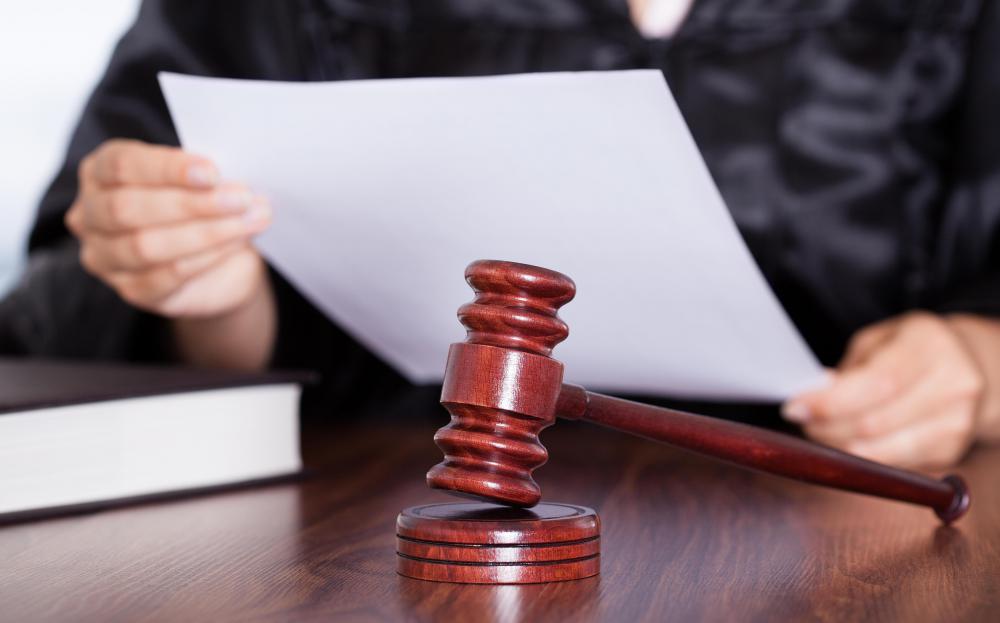At MyLawQuestions, we're committed to delivering accurate, trustworthy information. Our expert-authored content is rigorously fact-checked and sourced from credible authorities. Discover how we uphold the highest standards in providing you with reliable knowledge.
What Is a Motion Hearing?
When individuals or attorneys seek judicial intervention in a case, they file a motion—a formal request for the court to make a ruling or take specific action. According to the United States Department of Justice, motions are a common part of federal cases, with thousands filed annually across various jurisdictions. During a motion hearing, which is not always required, the involved parties present arguments and evidence before a judge.
The decision to hold a hearing may depend on the complexity of the issue at hand. Understanding what is a motion hearing can empower parties to effectively advocate for their legal rights within the judicial system.

A motion hearing is normally requested by one of the parties to the lawsuit. Alternatively, the judge may call the hearing on his or her own initiative. At a typical motion hearing, each party's lawyer is given the chance to present factual evidence and legal arguments in support of his or her client's position.
Motion hearings are typically more limited in scope than trials. Although a hearing often includes the presentation of oral testimony, the judge is generally given discretion to limit - or even deny altogether - oral testimony by witnesses or parties to the suit. During the hearing, the judge may ask questions about the factual and legal issues at hand. After listening to all of the testimony and weighing any written documentation submitted in support of, or in opposition to, the motion, the judge usually issues an order.

Motion hearings can be helpful in both criminal cases and civil lawsuits. They are often used to resolve preliminary issues before a trial begins, such as the suppression of evidence in a criminal case. Additionally, they may be used to resolve matters temporarily while a case is underway. For example, in a divorce proceeding, a motion hearing may be held to determine temporary child custody and child support arrangements. After trial, a motion hearing may be granted if a party asks a court to modify or enforce a judgment.

If a party to a suit files a motion for summary judgment, he or she may ask for a hearing. In a summary judgment motion, the requesting party ordinarily asks the court to make a decision before the trial takes place, based only on the facts set forth in each party’s pleadings. Courts generally agree to grant summary judgment motions if the facts in a case are not in dispute and only questions of law are at issue. Another type of hearing, called a motion to dismiss hearing, is ordinarily requested when one party believes the other party has failed to state a cause of action for which relief can be granted.
FAQ on Motion Hearing
What is a motion hearing in a legal context?
A motion hearing is a procedural step in a lawsuit where one party asks the court to decide on a specific issue before the trial. It's a meeting in the courtroom where attorneys present their arguments to the judge regarding the motion. This could involve requests for summary judgment, to suppress evidence, or to compel discovery, among other issues. The judge's decision on the motion can significantly affect how the case proceeds.
How does a motion hearing differ from a trial?
Unlike a trial, which is meant to resolve the main issues of a case, a motion hearing focuses on specific legal questions that need to be addressed before the trial. A trial involves witness testimonies, presentation of evidence, and jury deliberation (in a jury trial), aiming to establish the facts and render a verdict. In contrast, a motion hearing is typically shorter, involves legal arguments rather than factual evidence, and is decided by a judge without a jury.
What types of motions can be heard at a motion hearing?
There are various types of motions that can be presented at a motion hearing, including motions to dismiss the case, to compel discovery, for summary judgment, to change venue, to suppress evidence, and for protective orders. Each type of motion serves a different purpose, such as challenging the legal basis of the case, requesting the court to order the other party to produce evidence, or asking the court to make a ruling based on the law and facts presented in the motion papers.
What happens if a motion is granted or denied at a motion hearing?
If a motion is granted at a motion hearing, the court has accepted the requesting party's argument, and the court order will reflect the granted request, which could alter the course of the case. For instance, if a motion to dismiss is granted, the case may be terminated. If a motion is denied, the issue at hand remains unresolved in favor of the requesting party, and the case continues as it was before the motion was filed. Either decision can be appealed to a higher court.
Can a motion hearing result in a settlement?
While a motion hearing itself is not a settlement conference, the outcomes or discussions during the hearing can sometimes lead to a settlement. For example, if a motion for summary judgment highlights the strengths and weaknesses of each party's case, it may encourage the parties to negotiate a settlement to avoid the uncertainty of a trial. However, the primary purpose of a motion hearing is to address specific legal issues, not to resolve the entire case.
AS FEATURED ON:
AS FEATURED ON:













Discussion Comments
I am a defendant in a case, and the lawyer wants to add the plaintiff against me as a defendant with me and add new plaintiffs. Doesn't this jeopardize my rights?
What does this mean exactly? Minnesota family court- child custody from third party. My son is the father and his ex, the child's mother, gave their daughter to a 'neighbor' without his consent or knowledge. We just recently found out about this and he is listed as a co-respondent but has not been served. It appears it has gone into court in front of the same justice three or four times for a motion hearing but the results have been held every time. What exactly does Motion hearing result: held mean? Again, another court date is coming up, and he is listed as a co-respondent but has not been served again. He desperately wants to deny the third party -- a stranger to his daughter -- full custody, which is apparently the reason for the motion.The last motion hearing in the register of actions says
"Motion Hearing (2:00 PM) (Judicial Officer -----)
12/17/2014 Reset by Court to 01/20/2015 Result: Held"
What does it mean by "held" in this situation?
Often, motion hearings are in a great deal formalities. Things like when a defendant of a criminal case or even a legal suit is expected to plead guilty, or when someone is going to court for a minor thing like a speeding ticket, the motion hearing is just held to hear their plea or plea bargain more than for any real discovery or discussion.
Both the words motion and hearing have so many other meanings within both legal talk and business talk. For example, making a motion can be a synonym for making a suggestion that needs to be seconded in a meeting. Meanwhile, any sort of group meeting where different sorts of recommendations, criticisms, or other suggestions are heard by a group can be considered a hearing of some kind.
This ambiguity and reuse of words can make terms like "motion hearing" confusing for the average person.
Post your comments